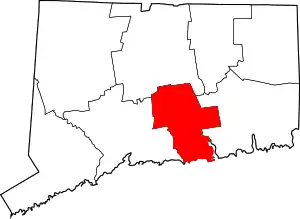Killingworth, Connecticut | |
|---|---|
| Town of Killingworth | |
_Public_Library.jpg.webp) Killingworth Library Association | |
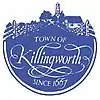 Seal | |
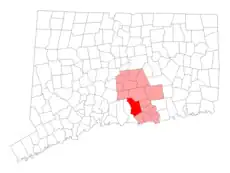  | |
| Coordinates: 41°22′50″N 72°34′35″W / 41.38056°N 72.57639°W | |
| Country | |
| U.S. state | |
| County | Middlesex |
| Region | Lower CT River Valley |
| Named | 1667 |
| Government | |
| • Type | Selectman-town meeting |
| • First Selectman | Eric Couture (D) |
| • Selectman | Joel D'Angelo (D) |
| • Selectman | Eric Nunes (R) |
| Area | |
| • Total | 35.8 sq mi (92.7 km2) |
| • Land | 35.3 sq mi (91.5 km2) |
| • Water | 0.5 sq mi (1.2 km2) |
| Elevation | 354 ft (108 m) |
| Population (2020) | |
| • Total | 6,174 |
| • Density | 175/sq mi (67.5/km2) |
| Time zone | UTC-5 (Eastern) |
| • Summer (DST) | UTC-4 (Eastern In) |
| ZIP code | 06419 |
| Area code(s) | 860/959 |
| FIPS code | 09-40710 |
| GNIS feature ID | 0213448[1] |
| Website | www |
Killingworth is a town in Middlesex County, Connecticut, United States. The town is part of the Lower Connecticut River Valley Planning Region. The population was 6,174 at the 2020 United States Census.[2]
History
Killingworth was established from the area called Hammonasset, taken from the local Native American tribe of the same name. The area originally incorporated the area of the present town of Clinton, which was separated from Killingworth along ecclesiastical borders in 1838.[3][4] Part of New London County prior to May 1785, Killingworth was then included in the newly formed Middlesex County, where it remains today.
The New England town received its name from Kenilworth, England, the previous home of one of the first settlers in New England, Edward Griswold.[4] Kenilworth's name resembled "Killingworth" during the colonial American period, though over time the pronunciations and spellings of the names drifted toward the two distinct modern ones.[3] A town and village in England called Killingworth and Killingworth Village, in the county of Tyne and Wear, do not appear to have any connection with Killingworth, Connecticut.
In the late 17th century, Killingworth became the birthplace of what would eventually become Yale University. The Rev. Abraham Pierson, the college's first president, taught some of the first classes in his Killingworth home—which is actually in present-day Clinton, Connecticut. However, in 1701, the college's first official home was constructed in Old Saybrook on the peninsula known as Saybrook Point donated by Yale's first Treasurer Nathanial Lynde. Eventually the school was moved to its present-day home in New Haven.[5]
Geography
According to the United States Census Bureau, the town has an area of 35.8 square miles (93 km2). Of this total, 35.3 square miles (91 km2) is dry land and 0.5 square miles (1.3 km2) – or 1.34% – is water-covered.
Killingworth also contains Chatfield Hollow State Park.
Government
Killingworth is governed by a Board of Selectmen, currently headed by First Selectman, Republican Nancy Gorski, with Jamie Mowat Young and Louis Annino Jr also on the board.[6]
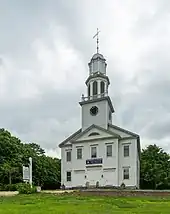
Demographics
| Census | Pop. | Note | %± |
|---|---|---|---|
| 1790 | 2,156 | — | |
| 1800 | 2,047 | −5.1% | |
| 1810 | 2,244 | 9.6% | |
| 1820 | 2,342 | 4.4% | |
| 1830 | 2,484 | 6.1% | |
| 1840 | 1,130 | −54.5% | |
| 1850 | 1,107 | −2.0% | |
| 1860 | 1,126 | 1.7% | |
| 1870 | 856 | −24.0% | |
| 1880 | 748 | −12.6% | |
| 1890 | 582 | −22.2% | |
| 1900 | 651 | 11.9% | |
| 1910 | 660 | 1.4% | |
| 1920 | 531 | −19.5% | |
| 1930 | 482 | −9.2% | |
| 1940 | 1,230 | 155.2% | |
| 1950 | 677 | −45.0% | |
| 1960 | 1,098 | 62.2% | |
| 1970 | 2,435 | 121.8% | |
| 1980 | 3,976 | 63.3% | |
| 1990 | 4,814 | 21.1% | |
| 2000 | 6,018 | 25.0% | |
| 2010 | 6,525 | 8.4% | |
| 2020 | 6,174 | −5.4% | |
| U.S. Decennial Census[7] | |||
As of the census[8] of July 1, 2015, there were 6,455 people, 2,513 households, and 1,765 families residing in the town. The population density was 184.7 inhabitants per square mile (71.3/km2). There were 2,598 housing units at an average density of 70.6 per square mile (24.9/km2). The racial makeup of the town was 96.4% White, 0.7% African American, 0.2% Native American, 1.1% Asian, 0.1% Native Hawaiian and Other Pacific Islander, 2.2% Hispanic or Latino, and 1.3% Two or More Races.
There were 2,513 households, with a 95.3% occupancy rate, out of which 23.9% had children under the age of 18 living with them, 73.8% were married couples living together, 4.3% had a female householder with no husband present, and 19.6% were non-families. 16.1% of all households were made up of individuals, and 8.0% had someone living alone who was 65 years of age or older. The average household size was 2.74 and the average family size was 3.08.
In the town, the population was spread out, with 4% under the age of 5, 23.9% under the age of 18, 3.6% from 18 to 24, 29.4% from 25 to 44, 28.0% from 45 to 64, and 16% who were 65 years of age or older. The median age was 40 years. For every 100 females, there were 98.4 males. For every 100 females age 18 and over, there were 96.8 males.
The median income for a household in the town was $112,137. The per capita income for the town was $48,537. None of the families and 1.7% of the population were living below the poverty line, including no under eighteens and 1.4% of those over 64.
| Voter Registration and Party Enrollment as of October 31, 2023[9] | |||||
|---|---|---|---|---|---|
| Party | Total voters | Percentage | |||
| Unaffiliated | 2,310 | 43.4% | |||
| Democratic | 1,437 | 27% | |||
| Republican | 1,502 | 28.2% | |||
| Minor parties | 79 | 1.48% | |||
| Total | 5,328 | 100% | |||
Education
Students attending school in Killingworth are a part of Connecticut's Regional School District #17, which consists of Haddam and its villages of Haddam Neck (located on the eastern bank of the Connecticut River) and Higganum. The high school, Haddam-Killingworth High School (often abbreviated as simply "HK"), is located in Higganum. The middle-school, Haddam Killingworth Intermediate-Middle School,[10] was built in Killingworth in 2006 and houses grades 4 through 8. The elementary schools, Burr Elementary School and Killingworth Elementary School are located in Higganum and Killingworth respectively. The school's sports teams are called the 'Cougars'.
Transportation
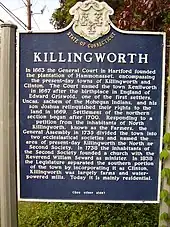
The Estuary Transit District provides public transportation throughout Killingworth and the surrounding towns through its 9 Town Transit Service. Services include connections to the Old Saybrook Train Station, served by Amtrak and Shoreline East railroads.
Popular culture
The town was the subject of the poet Henry Wadsworth Longfellow's poem "The Birds of Killingworth" published in Tales of a Wayside Inn.
1999: The largest tree in Rockefeller Center history, 100 feet (30 m) high, was chosen from Killingworth, CT.
Notable people
- Jeff Bagwell, Hall of Fame Major League Baseball player for the Houston Astros
- Carleton Beals, journalist, author, historian, and a crusader with special interests in Latin America[11]
- Abel Buell, publisher of the first map of the new United States created by an American[12]
- Jonathan Bush, American banker, brother of President George H. W. Bush
- Titus Coan, missionary to Hawaii
- Silas Halsey, former US Congressman
- Haynes Johnson, Pulitzer Prize–winning journalist, author and political analyst
- Camille Kostek, model who was on the cover of Sports Illustrated Swimsuit Issue
- Ricki Lake, television personality
- Hugh Lofting, author of the Doctor Dolittle series
- Washington F. Willcox, U.S. Congressman (March 4, 1889 – March 3, 1893), born on North Chestnut Hill on August 22, 1834
Listings on the National Register of Historic places
- Emmanuel Church, added August 5, 1999
- Oak Lodge, added September 4, 1986
- Parmelee House (Killingworth, Connecticut).
References
- 1 2 U.S. Geological Survey Geographic Names Information System: Killingworth, Connecticut
- ↑ "Census - Geography Profile: Killingworth town, Middlesex County, Connecticut". Retrieved December 17, 2021.
- 1 2 Killingworth Historical Society Archived 2008-10-12 at the Wayback Machine
- 1 2 Town of Killingworth Historical Sign, 1981
- ↑ "History of Killingworth". Archived from the original on October 12, 2008. Retrieved September 9, 2007.
- ↑ "Town of Killingworth". www.townofkillingworth.com. Retrieved April 11, 2018.
- ↑ "Census of Population and Housing". Census.gov. Retrieved June 4, 2015.
- ↑ "U.S. Census website". United States Census Bureau. Retrieved January 31, 2008.
- ↑ "Registration and Party Enrollment Statistics as of October 31, 2023" (PDF). Connecticut Secretary of State. Retrieved November 8, 2023.
- ↑ Cassandra Day (March 8, 2019). "Plans to close Haddam Elementary School 'complete,' officials say". The Middletown Press. Retrieved January 20, 2020.
- ↑ United States. Congress. Senate. Committee on the Judiciary (April 11, 1961). "Fair Play for Cuba Committee. Hearings before the Subcommittee to Investigate the Administration of the Internal Security Act and Other Internal Security Laws of the Committee on the Judiciary, United States Senate, Eighty-seventh Congress, first session ." Washington, U.S. Govt. Print. Off. Retrieved April 11, 2018 – via Internet Archive.
- ↑ "Abel Buell". Archived from the original on May 14, 2008. Retrieved June 3, 2008.
{{cite web}}: CS1 maint: unfit URL (link)
